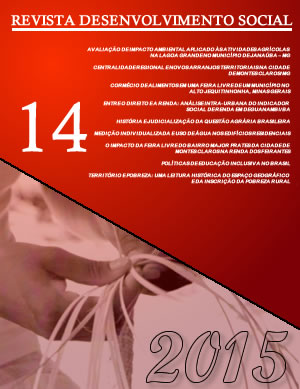Evaluation of environmental impact applied to agricultural activity in Lagoa Grande, in the of municipality of Janaúba-MG
Keywords:
Eutrofização, Analise físico-químico, Transporte de Material, Matas CiliaresAbstract
Lagoa grande is a natural pond, located in Janaúba, north of Minas Gerais, which have
been compromised by falling quality of available water, endangering the ecosystem and
the life of humanity. The region has benefited from the installation of Gorutuba / Lagoa
Grande projects. This environment highlights the concentration of public irrigation
schemes implemented in the community and around the same. The aim of this study
was to analyze the environmental impacts that have degraded the Great Pond, resulting
from human activities, including what the Lagoa Grande irrigation project provided the
lagoon, the physico-chemical state of its water and its importance to the local
population. Through research, in situ study casoda was taking place, with photographs
of cultivated areas, identifying the illegal abstraction of water in the pond itself, made to
the physical-chemical water analysis and the results obtained compared with the
CONAMA Resolution 357 / 2005. It is observed that the irrigation project was
compounded for the socioeconomic growth of the local population and perpetuate the
pond, but this means also suffered severe alterations, including the removal of riparian
vegetation and material transport into the Lagoa grande, which is in process of
eutrophication, reflecting increasing interventions, being very important for planning
actions that seek recovery and sustainable means to Lagoa grande.
Downloads
Downloads
Published
How to Cite
Issue
Section
License
Esta licença permite que outros(as) façam download do trabalho e o compartilhe desde que atribuam crédito ao autor(a), mas sem que possam alterá-lo de nenhuma forma ou utilizá-lo para fins comerciais.












.png)
.png)




.png)









